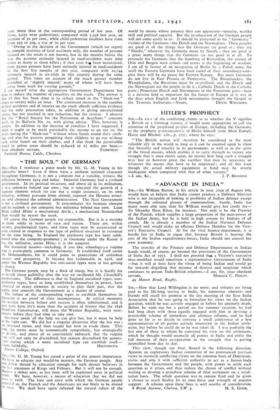" THE SOUL" OF GERMANY SIR, —May I reinforce a point
made by Mr. G. M. Young in his admirable letter? Even if there were a uniform national character throughout Germany, it is not a constant but a variable, witness the difference between 1914 and today. Imperial Germany had a civilised government. In its political structure, and above all in its militarism, it was centuries behind our own ; but it tolerated the growth of a humane element which (to cite but a single instance), on its own initiative, without pressure from abroad, exposed the Herrero atroci- ties and cleansed the colonial administration. The Nazi Government is not a civilised government. It exterminates the humane element and its outlook as not centuries but millennia behind our own. Leon Blum called Hitler a mechanised Attila ; a mechanised Neanderthal Man would be nearer the mark.
Of course the German people are responsible. But it is a mistake to think solely in terms of race and nation. There- are, within nations, psychological types, and these types may be accentuated or even created in-response to the type of political structure in existence for the time being. In England the predatory type has been subli- mated into the company-promoter ; in Germany under the Kaiser it was the militarist, under Hider it is the gangster.
For historical reasons—including, if you like, ethnologya vulpine type is particularly common in Germany. It established itself under the Hohenzollerns, for it could point to generations of unbroken success and prosperity. It • became less fashionable in 1918, and under the Weimar Republic less anti-social types were at last getting a chance.
The German people may be a flock of sheep, but it is hardly for its to talk about gullibility after the way we swallowed Mr. Churchill's predecessors. The difference is that in England socialised types, non- predatory types, have so long established themselves in 'power, have attracted so many elements in society to play their part, that the public now controls the Government as a matter of course.
The failure of the corresponding types to establish themselves in Germany is no proof of their incompetence. At critical moments the margin between failure and success is often infinitesimal, and it may have been litt'e more than the accident of history that the 1848 Frankfort Constitution, still more the Weimar Republic, were over- thrown before they had time to take root.
Germany needs all the help we can give her, but it must be help of the right sort. We did her a singular disservice after the last war ; we imposed terms, and then taught her how to evade them. This time the terms must be economically sympathetic, but strategically so drastic, and above all so consistently enforced, that the vulpine 17e will not only be discredited, but remain discredited for genera- tions during which a more socialised type can establish itself.—


























 Previous page
Previous page